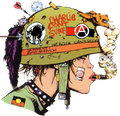Most Westerners already hate communists and carry the grudge against the USSR. Anarchists don't really deviate too much from some generic Westerner. At best, they uphold people like John Brown or support Spanish syndicalists liquidating the clergy during the Spanish Civil War. But in terms of what faction/state/org to support, I honestly don't see a whole lot of difference between an anarchist and some progressive liberal. Their disagreement comes from tactics and ultimate goal, but they still support and oppose the same people in the end.
Seriously, what faction do anarchists support that someone who is a member of the US Green Party wouldn't support? Yes, anarchists think voting is cringe, but your average US progressive isn't going to oppose the Zapatistas. If you explain Kronstadt to your average US progressive, how many of them would support Trotsky crushing the rebellion with the Red Army over the striking sailors like the way anarchists do? As far as history is concerned, you could pretty much explain every single disagreement communists and anarchists have to a progressive liberal, and the progressive liberal will almost always side with the anarchist. I honestly can't think of a single instance where the progressive would go, "Okay, you anarkiddies are being cringe. The tankies have a point."
 hegemony so the hate machine isn't spun up.
hegemony so the hate machine isn't spun up.

 rather than
rather than  so you've done ok I guess
so you've done ok I guess